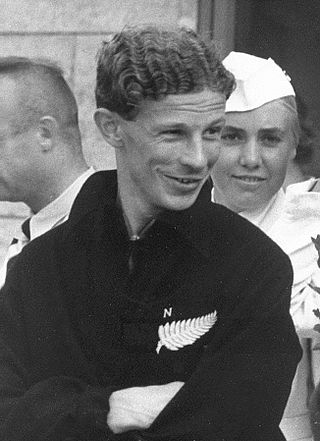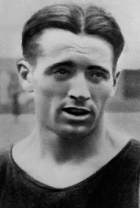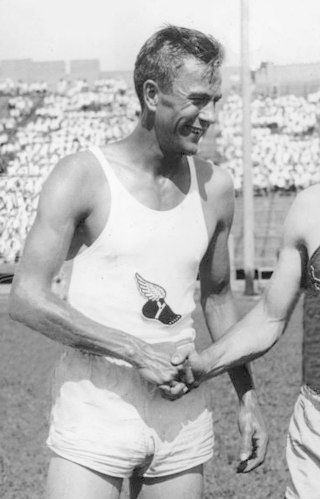
John Edward Lovelock was a New Zealand athlete who became the world 1500m and mile record holder and 1936 Olympic champion in the 1500 metres.

Luigi Beccali was the first Italian to win an Olympic gold medal in running, in the 1500 metres at the 1932 Summer Olympics, and the first Italian to win a European Championship title in athletics.

The men's 1500 metres at the 2004 Summer Olympics as part of the athletics program were held at the Athens Olympic Stadium from August 20 to 24. Thirty-eight athletes from 26 nations competed. The event was won by Hicham El Guerrouj of Morocco, the nation's first title in the event after coming second twice ; El Guerrouj was the fifth man to win a second medal in the event. Bernard Lagat's silver put Kenya on the podium in the event for the third straight year; the United States and Great Britain were the only other nations to have accomplished that. It also made Lagat the sixth man to win two medals in the event, just behind El Guerrouj in both 2000 and 2004. Rui Silva's bronze was Portugal's first medal in the event.
The men's 800 metres was the middle of the seven men's track races in the Athletics at the 1964 Summer Olympics program in Tokyo. 47 athletes from 32 nations competed. The maximum number of athletes per nation had been set at 3 since the 1930 Olympic Congress. The first round was held on 14 October, with the semifinals on 15 October and the final on 16 October. The event was won by Peter Snell of New Zealand, successfully defending his 1960 gold medal, and completing the first half of his 800 metres/1500 metres double. Bill Crothers of Canada took silver, the first 800 metres medal for that nation since 1936 and matching Canada's best-ever result in the event. Wilson Kiprugut's bronze was the first medal by Kenya in any event; Kenya would become a frequent fixture on the men's 800 metres podium.

The men's 1500 metres was the third-longest of the seven men's track races in the Athletics at the 1964 Summer Olympics program in Tokyo. It was held on 17 October, 19 October, and 21 October 1964. 50 athletes from 34 nations entered, with 7 not starting the first round. The maximum number of athletes per nation had been set at 3 since the 1930 Olympic Congress. The first round was held on 17 October, with the semifinals on 19 October and the final on 21 October.

The men's 1500 metres middle-distance event at the 1932 Summer Olympics took place on August 3 and August 4 at the Los Angeles Memorial Coliseum. Twenty-four athletes from 14 nations competed. The 1930 Olympic Congress in Berlin had reduced the limit from 4 athletes per NOC to 3 athletes. The event was won by Luigi Beccali of Italy, earning the nation's first medal in the 1500 metres. Canada also won its first 1500 metres medal, with Phil Edwards's bronze.

The men's 1500 metres event at the 1988 Summer Olympics in Seoul, South Korea had an entry list of 59 competitors from 46 nations, with four qualifying heats (59) and two semi-finals (26), before the final (12) took place on Saturday October 1, 1988. The maximum number of athletes per nation had been set at 3 since the 1930 Olympic Congress. The event was won by Peter Rono of Kenya, the nation's first title in the event since 1968 and second overall.

The men's 1500 metres was an event at the 1956 Summer Olympics in Melbourne, Australia, with the final held on Saturday, December 1, 1956. There were a total number of 37 participants from 22 nations. The maximum number of athletes per nation had been set at 3 since the 1930 Olympic Congress. The event was won by Ron Delany of Ireland, the nation's first 1500 metres medal. The silver medalist was Klaus Richtzenhain, the only medalist in the event for the United Team of Germany. John Landy took bronze, Australia's first medal in the event since 1896.

The men's 1500 metres was an event at the 1996 Summer Olympics in Atlanta, Georgia. There were 57 competitors from 37 nations. The maximum number of athletes per nation had been set at 3 since the 1930 Olympic Congress. The event took place between 29 July and 3 August. The event was won by Noureddine Morceli of Algeria, the nation's first championship in the men's 1500 metres. Fermín Cacho of Spain was unable to repeat as gold medalist, but took silver to become the fourth man to win two medals in the event.

The men's 1500 metres was an event at the 1992 Summer Olympics in Barcelona, Spain. There were a total number of 51 participating athletes from 40 nations, with four qualifying heats. The maximum number of athletes per nation had been set at 3 since the 1930 Olympic Congress. The event was held from 3 August to 8 August 1992. The event was won by Fermín Cacho of Spain, the nation's first title in the men's 1500 metres. Morocco won its first medal in the event with Rachid El Basir's silver. Qatar won its first Olympic medal in any event with Mohamed Suleiman's bronze.

The men's 1500 metres was an event at the 1984 Summer Olympics in Los Angeles, California. The final was held on August 11, 1984. Fifty-nine athletes from 40 nations competed. The maximum number of athletes per nation had been set at 3 since the 1930 Olympic Congress. The event was won by Sebastian Coe of Great Britain, the first man to successfully defend an Olympic 1500 metres title. Steve Cram's silver made it the first time a nation had gone 1–2 in the event since Great Britain had done it in 1920. José Manuel Abascal's bronze was Spain's first medal in the event.
Miklós Szabó was a Hungarian middle distance runner who held world records over two distances.
The men's 800 metres event at the 1936 Summer Olympic Games took place between August 2 and August 4. Forty-two athletes from 23 nations competed. The maximum number of athletes per nation had been set at 3 since the 1930 Olympic Congress. The final was won by American John Woodruff.

The men's 400 metres hurdles event at the 1936 Summer Olympic Games took place on August 3 and August 4. There were 32 competitors from 20 nations. The maximum number of athletes per nation had been set at 3 since the 1930 Olympic Congress. The final was won by American Glenn Hardin. After two Games of silver and bronze medals, it was the United States' first victory since 1920 and sixth overall. However, it was the first time since 1900 that the Americans had only one medalist in the event. John Loaring took Canada's first 400 metres hurdles medal since 1900 with his silver. Miguel White gave the Philippines a bronze in its 400 metres hurdles debut.

The men's 400 metres hurdles event at the 1932 Olympic Games took place on July 31 and August 1 at the Los Angeles Memorial Coliseum. There were 18 competitors from 13 nations. The 1930 Olympic Congress in Berlin had reduced the limit from 4 athletes per NOC to 3 athletes. The event was won by Bob Tisdall of Ireland, the nation's first medal in the event in its 400 metres hurdles debut. The United States took silver and bronze, extending its streak of taking at least silver in all 7 appearances of the event to that point. Taylor became the first man to earn three medals in the event, adding to his 1924 gold and 1928 bronze. Defending champion David Burghley of Great Britain finished fourth.

The men's 1,500m metres was an event at the 1972 Summer Olympics in Munich, West Germany. The final was held on Sunday 10 September 1972 and was contested by 10 athletes. The semi-finals were held on Saturday 9 September 1972 and were contested by 27 athletes. The heats were held on Friday 8 September 1972 and 71 athletes entered, with 66 runners from 46 nations competing. The maximum number of athletes per nation had been set at 3 since the 1930 Olympic Congress. The event was won by Pekka Vasala of Finland, the nation's first championship in the 1500 metres since back-to-back wins in 1924 and 1928. Kipchoge Keino of Kenya came half a second short of becoming the first man to successfully defend Olympic gold in the event; instead, his silver made him just the second man to win two medals of any color in the 1500 metres.
Archie Joseph San Romani was an American middle-distance runner. San Romani placed 4th in the 1500 meters at the 1936 Summer Olympics in Berlin and set a world record at 2000 meters the following year.
William Robert Bonthron was an American middle-distance runner who held the world record at 1500 meters for two years.

Eugene George "Gene" Venzke was an American middle-distance runner. Venzke qualified for the Olympic final at 1500 meters in 1936 and set indoor world records at both 1500 meters and the mile.
Glen Wilson Dawson was an American runner. He represented the United States in the men's 3000-meter steeplechase at the 1932 and 1936 Summer Olympics, qualifying for the final both times.





